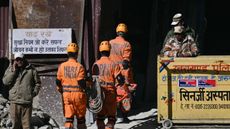Run up a white flag: We've surrendered to the Taliban
If we've decided to 'cut and run' by holding talks with Afghan insurgents, why not just cut and run now?

WE might as well run up a white flag: NATO has just surrendered to the Taliban. After 11 years of fighting, the US and its allies have agreed to open direct negotiations with Taliban representatives. One key condition of the talks was that the Taliban renounce violence. Astonishingly, the US dropped its long-standing demand that the movement renounce ties with al-Qaeda as a precondition for the talks. In other words, the central aim of the NATO intervention in Afghanistan – to stop it being a safe haven for al-Qaeda, has been abandoned. The first meeting is due to take place today in Doha, the Qatari capital, where the Taliban have opened their first official overseas office. Needless to say, within a few hours of agreeing to 'renounce violence', the Taliban claimed responsibility for a rocket attack on Bagram airbase outside Kabul in which four American soldiers were killed. I feel sorry for President Obama and Prime Minister Cameron. Afghanistan was not of their making. And whatever we might feel about the PM's strategic judgement over Libya and, now, Syria – he was always a reluctant warrior in Helmand. The two men are merely trying to clear up the hospital pass they received from their predecessors. Not that either George Bush or Tony Blair will ever face a reckoning for their incompetence. In the UK, certainly, we live in a 'fire and forget' world. The politicians who despatched our troops abroad – in this case to (another) defeat – are subject to no sanctions other than the ballot box. That is deemed sufficient. And the generals who make tactical errors that would embarrass a school cadet force seem to accumulate ever more medals and honours. The initial mistake, from which our forces never really recovered, was the army high command's responsibility alone. It was so basic as to take one's breath away. They decided in 2006 when our troops first entered the country in force, to disperse them in 'platoon houses' – isolated little bases that were cut off from each other. They were very nearly overwhelmed – saved only by air power and the sheer bloody-minded stubbornness of the Paratroopers, Gurkhas and Irish Rangers inside them. This style of fighting went against every known military maxim in every age of warfare. Concentration of force is a principle of war. Never 'penny packet' your troops. A Roman centurion would have been astonished. A moustachioed 'grognard' in Napoleon's army would have laughed out loud. Even General Percival, the most unsuccessful British general in history never made that mistake. As if British soldiers did not have enough to put up with, some of our senior commanders in Afghanistan dreamed up a whole new military vice previously unknown in Western warfare. They devised ever more complex, finely-tuned, military plans – usually with over-the-top names and explained in macho military jargon – that would be admirable and effective against a conventional opponent but were entirely pointless against a guerrilla enemy who could melt away into the community at will. The Tyrie report suggests that we should jail reckless bankers – perhaps we should do the same for reckless politicians and military men? At least, let's put the military commanders on a 'no win, no gongs' contract. The overall head of the British armed forces during the initial disastrous phases of our Afghan deployment, Air Chief Marshal Sir Jock Stirrup, was made a Knight of the Garter by the Queen on Monday. Obama and Cameron may not be responsible for the unfolding disaster in Afghanistan but they are currently in charge and appear to have no answer to a rather obvious question. If we are cutting and running, why don't we just cut and run right now? As the young John Kerry, now US Secretary of State, then a decorated Navy lieutenant just back from a tour of duty in the Mekong Delta put it in his April 1971 testimony to Congress: "How do you ask someone to be the last person to die for a mistake?" As our troops return, this war will become more and more difficult for those of us back home to accept. Until now, even doubters have been sustained by a heroic narrative. Forget the politicians and the generals and concentrate on the traditional virtues of the British soldier displayed magnificently in this difficult theatre of operations. We get a glimpse of their bravery and devotion to duty in citations for gallantry medals, but the public knows full well the guts and discipline of the vast majority of soldiers go unreported. The British public have been greatly moved. As a result they have supported military charities with huge spirit and generosity. But sadly, as the stories of gallantry fade in the memory, we will be left with two uncomfortable questions that just won't go away. If it was winnable, why didn't we win? If it was unwinnable, why did we go?
Subscribe to The Week
Escape your echo chamber. Get the facts behind the news, plus analysis from multiple perspectives.

Sign up for The Week's Free Newsletters
From our morning news briefing to a weekly Good News Newsletter, get the best of The Week delivered directly to your inbox.
From our morning news briefing to a weekly Good News Newsletter, get the best of The Week delivered directly to your inbox.
Create an account with the same email registered to your subscription to unlock access.
Sign up for Today's Best Articles in your inbox
A free daily email with the biggest news stories of the day – and the best features from TheWeek.com
-
 The hunt for Planet Nine
The hunt for Planet NineUnder The Radar Researchers seeking the elusive Earth-like planet beyond Neptune are narrowing down their search
By Chas Newkey-Burden, The Week UK Published
-
 Magazine interactive crossword - April 26, 2024
Magazine interactive crossword - April 26, 2024Puzzles and Quizzes Issue - April 26, 2024
By The Week US Published
-
 Magazine solutions - April 26, 2024
Magazine solutions - April 26, 2024Puzzles and Quizzes Issue - April 26, 2024
By The Week US Published
-
 Puffed rice and yoga: inside the collapsed tunnel where Indian workers await rescue
Puffed rice and yoga: inside the collapsed tunnel where Indian workers await rescueSpeed Read Workers trapped in collapsed tunnel are suffering from dysentery and anxiety over their rescue
By Sorcha Bradley, The Week UK Published
-
 Gaza hospital blast: What the video evidence shows about who's to blame
Gaza hospital blast: What the video evidence shows about who's to blameSpeed Read Nobody wants to take responsibility for the deadly explosion in the courtyard of Gaza's al-Ahli Hospital. Roll the tape.
By Peter Weber, The Week US Published
-
 Giraffe poo seized after woman wanted to use it to make a necklace
Giraffe poo seized after woman wanted to use it to make a necklaceTall Tales And other stories from the stranger side of life
By Chas Newkey-Burden, The Week UK Published
-
 Helicopter sound arouses crocodiles
Helicopter sound arouses crocodilesTall Tales And other stories from the stranger side of life
By Chas Newkey-Burden, The Week UK Published
-
 Woman sues Disney over 'injurious wedgie'
Woman sues Disney over 'injurious wedgie'Tall Tales And other stories from the stranger side of life
By Chas Newkey-Burden, The Week UK Published
-
 Emotional support alligator turned away from baseball stadium
Emotional support alligator turned away from baseball stadiumTall Tales And other stories from the stranger side of life
By Chas Newkey-Burden, The Week UK Published
-
 Europe's oldest shoes found in Spanish caves
Europe's oldest shoes found in Spanish cavesTall Tales And other stories from the stranger side of life
By Chas Newkey-Burden, The Week UK Published
-
 Artworks stolen by Nazis returned to heirs of cabaret performer
Artworks stolen by Nazis returned to heirs of cabaret performerIt wasn't all bad Good news stories from the past seven days
By The Week Staff Published